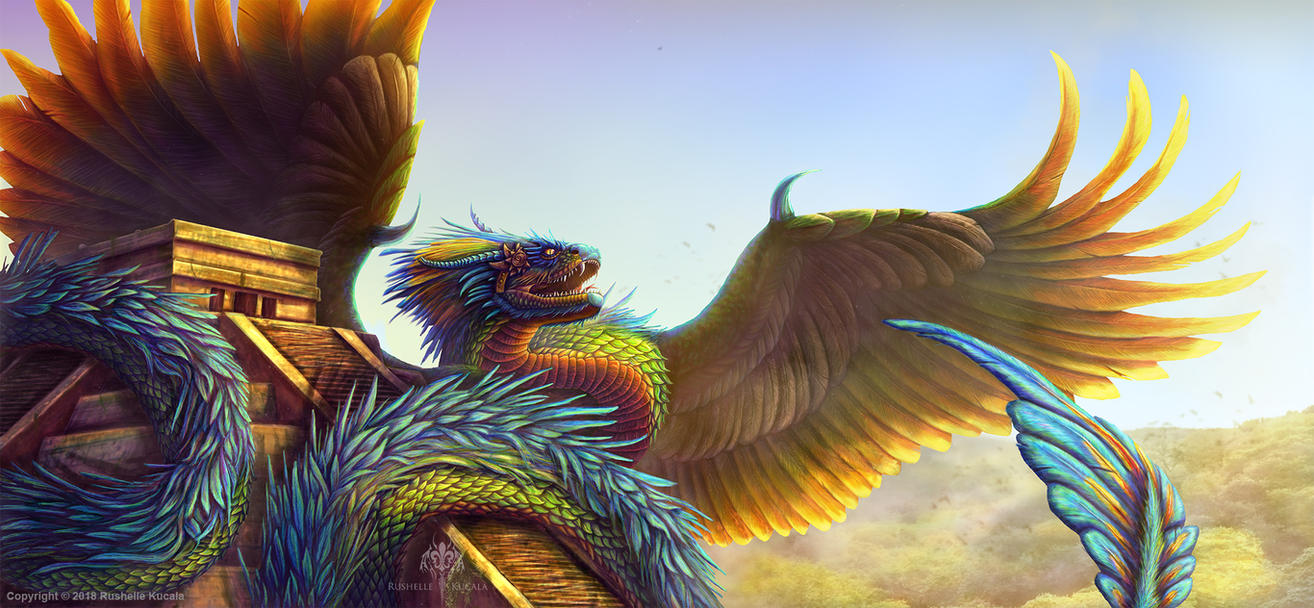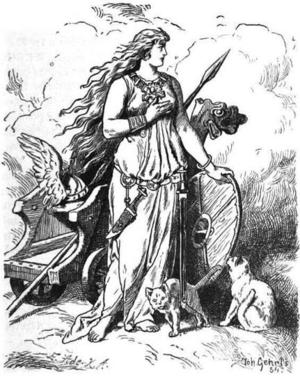
Just a little fun idea, my top 10 favorite mythological deities. This list does not include deities from major modern religions. I don't know that many mythologies so don't expect a huge reference pool.
10: Nephthys
Nepthys is underrated as a Goddess. She is the sister of some of the biggest names in Egyptian Mythology; Osiris, Set and Isis and archaeological evidence suggest she was as important then them though her role is more mysterious. Nephhys was often paired with her sister Isis as twin representatives of feminine power. Nephthys was paradoxically a mothering nurturing force, often depicted breastfeeding the infant Pharaoh and watching over the Pharaoh as moonlight over the forces in the darkness but was also a destructive force that could incinerate the enemies of the Pharaoh. What's interesting to note is when Set was being a villain, the lord of the desert and sandstorms and chaos, Nepthys was not with him. But when Set was being noble such as helping Ra slay Apophis every night, it was then she would be depicted with him, as his wife. As such there is some element of the civilizing power of the feminine within Nepthys, turning the primary villain of the Egyptian pantheon into a more noble force.

9: Quetzalcoatl
The Aztec Gods can seem relatively alien and strange these days, though in some respects they have a very interesting duality to them all. Tezcatlipoca for instance while the god of night, jaguars and strife was also the patron of slaves and sought vengeance on their behalf against cruel masters. Quetzalcoatl is another one of these paradoxes. The "feathered serpent" is at once a creature of the ground, a serpent, and a creature the sky being a feathered flying being. Even more surprising is Quetzalcoatl's nobility even to a contemporary moral standard. Some sources even suggest that he opposed human sacrifice which would be very strange for an Aztec God. Lord of the Star of Dawn seems to be some embodiment of the spirit of nature and it's internal paradox.

8: Freyja
Freyja is a goddess cut in the ancient Ishtar mold of being a goddess both of love, sex, fertility but also of war and death. Freyja was a member of the Vanir who waged was with the Aesir. Freya and her twin brother Frey were both sent to live with the Aesir in exchange for peace. Freyja's Vanir origin are perhaps where her domain as goddess of love come from while her Aesir domain is possibly where her Goddess of War side comes from. Freyja is one of the most interesting of these dual goddess of love and war types goddesses I've seen because most of the others seem purely impulsive (like Ishtar going from lovey and wanting to sleep with Gilgamesh to Hateful and Violent when he rejects her) whereas Freyja seems to not particularly like war and do so out of necessity.

7: Ra
Ra is the Lord of the Egyptian Pantheon (generally) and represents the all ruling Sun. Ra in some depictions is close to omnipotence having created himself out of nothing and forming the other concepts from parts of him. What makes Ra interesting is just how many aspects and forms he has, such as Ra-Atum the creator, Ra-Horakthy the Avenger, and so on.


6: Sekhmet/Hathor
Sekhmet was originally the eye of Ra sent by him to punish the mortals, but her bloodlust became so insatiable that she could not be stopped. She is a merciless goddess of warfare and vengeance. She threatened everyone until a clever plan was hatched to stop her. Large amounts of wine disguised as blood were fed to her until she became so drunk she could no longer continue to fight and returned peacefully to Ra's side where he turned her into Hathor, the peaceful goddess of love, healing and generally everything unwarlike so Sekhmet would not go on a rampage. Best way I can describe it is...
Top 10 Anime Redemptions

5: Xochiquetzal
Contrary to most Aztec deities, Xochiquetzal actually had a fairly simple role in Aztec Mythology. She was a goddess of feminine sexuality, beauty and childbirth. Xochiquetzal for her limited role is quite the mystic goddess, seen as a patron of artists, of the mysterious appeal of the feminine that draws the males. She is also the patron of butterflies, starting that association early, and is the mother of Quetzalcoatl which is neat.

4: Prometheus
Prometheus is a noble figure that does not get the like he deserves :( He used to. Back a few hundred years ago Prometheus was the archetypal symbol of standing against tyranny. He gave Humanity fire, the power that would allow them, in the mythology itself, to rival the gods. Zeus chained him up, and had a vulture eat out his internal organs every day to regenerate at night. Zeus offered to free him if he would use his foresight to tell him who would surpass and surplant Zeus as King of the Gods. But Prometheus every day would not tell Zeus what he wanted to know, no matter what tactic he tried to use. Prometheus is a symbol of the nobility of man in some cases.

3: Venus
Note, I like the Roman Venus over her Greek counterpart Aphrodite as the Roman Venus was often much nicer. After all the Romans traced their ancestry back to the legendary Aeneas, son of Venus. Venus was born when the genitals of the sky primordial Uranus was castrated by his son the Titan King Saturn and fell into the ocean the foam creating the goddess. She was the sole goddess feared by Jupiter, king of the gods, himself, as even he was susceptible to the pulling of love as shown by his many number of children. Venus is the representative of love itself, and her aspects represented the many forms of love even the celestial love.

2: Athena
Athena is the patron of the civilized things. The crafts, the arts, strategy, architecture. More broadly Athena is wisdom, she is the embodiment of the human consciousness, the logos that would later be discovered to be so preciously divine. Athena is the human reason that creates civilization. Athena is the nobility of humanity thus to me. Despite being a virgin goddess, Athena unlike her half-sister Artemis seemed fond of men and was the patron of male heroes. This is why she is often used as symbol of freedom and democracy. She is also on a more narrative sense by far one of the nicest Olympians and I rarely ever see anyone mention it. People are quick to talk about how Hades is surprisingly nice because he only RARELY did things that were mean towards humanity. The only times Athena did something of that accord was possibly Arachne and Medusa, and even some versions of the stories suggest both Aranche and Medusa are much to blame for what happened to them. To give an idea of Athena's niceness let me compare two stories. Her Half-Sister the also Virgin Goddess Artemis was bathing and the male hunter Actaeon ran across her. Enraged she turned him into a stag and had his own dogs eat him alive. Conversely when Athena was bathing and the male Tiresias came across her, he was stuck blind and upon learning that he accidentally had done so gave him the gift of foresight. Also just as circumstance, a lot of her stories are really entertaining.

1: Isis
Isis, the Egyptian goddess of motherhood, magic, feminine power, wisdom. Isis is like the ideal mix of several entities on this list. To secure kingship for her husband Osiris and their son Horus Isis managed to trick even the nigh-omnipotent Ra, making a serpent out of clay and his drool, and then using that serpent to bite him (possible because it too had Ra's power). Ra could only relieve the snake bite with Isis' help if he told her his true name giving her the control of the universe. Isis serves in all stories about her as a devoted mother and wife, while also being a competent and mystically powerful goddess. She was so popular that during the Roman Empire, when most of the gods were being forsaken, the cult of Isis still prospered across the empire. It is well known that I am a fan of the magical girl genre, a genre about the intersection of femininity and mysticism, the unique relationship of these two things, and Isis represents that intersection, the universal mystical feminine energy that births and loyally aids the masculine physical reality.
No comments:
Post a Comment